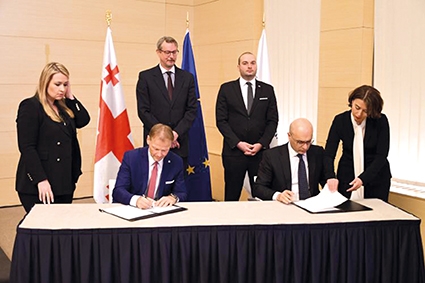EU to Help Build & Upgrade 100 km of East-West Highway
This Tuesday, February 19, the European Investment Bank (EIB) and other EU institutions signed a new deal with the Georgian government committing funds to help build and upgrade transport infrastructure in the country.
The EIB will lend the Georgian government €250 million, fully covered by the EU’s Comprehensive Guarantee, to finance an extended upgrade of Georgia’s East-West Highway. The East-West Highway runs from Tbilisi to the Black Sea Coast, and it is one of the country’s main thoroughfares. It is a direct part of Europe’s TEN-T (Trans-European Network – Transport) infrastructure.
The EIB has financed €250 million worth of projects related to the East-West Highway since 2012. The new agreement is the largest so far.
EIB Vice-President Vazil Hudák commented, “With this new loan the EIB is consolidating its position as a top financier of infrastructure in Georgia. We will contribute to improving mobility, a prerequisite for productivity growth, and road safety along a major segment of the East-West Highway. EU engagement will thus bring more tangible benefits to the Georgian people.”
The project is expected to increase Georgia’s connectivity to Europe by improving road safety and travel conditions, lowering travel times and reducing vehicle operating and maintenance costs, while enhancing mobility and access to social services and economic activities for the Georgian population. Dozens of temporary jobs will also be created by the road works.
“The development and advancement of strategic transport infrastructure in the country is particularly important for the increased competitiveness of Georgia and enhanced transport functionality,” said Prime Minister Mamuka Bakhtadze.
EU Ambassador to Georgia Carl Hartzell added, “Improved road networks, especially key ones such as Georgia’s East-West Highway are crucial for economic development, connecting people and facilitating trade and transit within Georgia and with the wider region.”
The construction of the high-speed East-West Highway began in March 2006, and was originally called the “Tbilisi-Senaki-Leselidze.” It was envisioned to run north to Salkhino, Abkhazia, but construction plans on that section were halted after the 2008 War and the subsequent occupation of Georgia’s Abkhazia region. Currently, the East-West Highway is a complex of new and old road infrastructure, including the E-60 (Poti-Tbilisi-Red Bridge) and the E-70 (Poti-Batumi-Sarpi) highways. The total length of the East-West high-speed highway is 390 km.
Last May, Factcheck.ge evaluated government promises that the road would be completed by 2020, in accordance with the government’s Four Point Plan. “To finish the work by 2020, approximately 66.6 km of road have to be built each year whereas only approximately 18 km of road have been built annually since Georgian Dream’s coming to power. Of importance is that the remaining portions of the high-speed highway are the ones which are the most difficult to build,” explained Factcheck. As of May 2018, just 190 km of the highway were paved, and a 167 km-long stretch was open to traffic. At that time, the Roads Department of Georgia planned for the sections of road between Chumateleti – Khevi – Ubisa – Shorapani – Argveta to be completed between November 2021 and December 2022, completing the East-West Highway.
In October 2018, the Georgian government signed an agreement with the Asian Development Bank to finance the "East-West Express Highway Improvement Project.” The €255 million project is designed to build 12 km of four-lane road between Khevi and Ubisa, and to support the development of the East-West Highway railroad. Due to complex geological conditions, the project includes the construction of 35 bridges, with a total length of 8.3 km, and 20 tunnels stretching 9.4 km. The project is expected to be completed by June 2024.
By Samantha Guthrie
Image source: European Union












